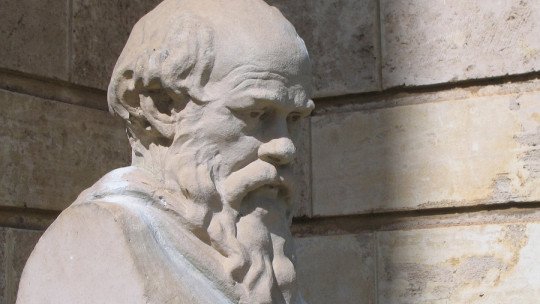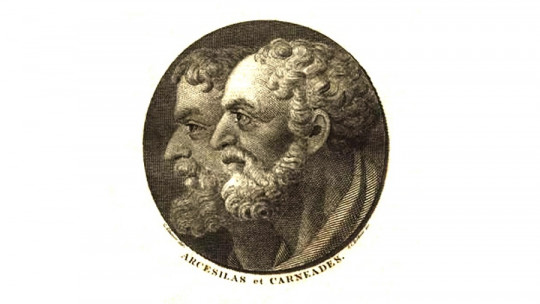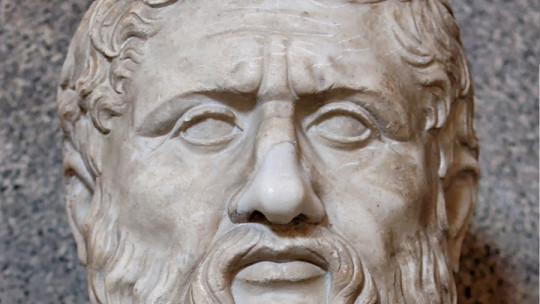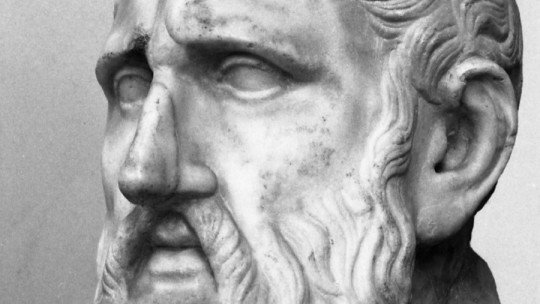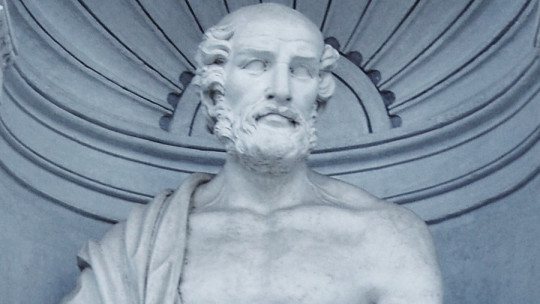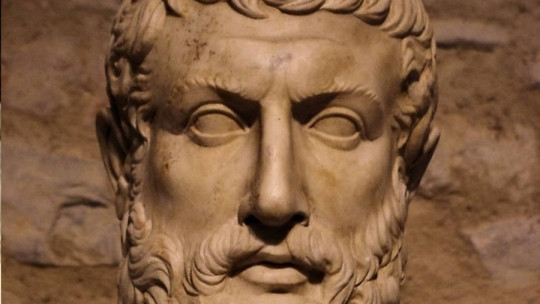
Ancient philosophy can be divided into different stages. The philosophers before Socrates are called “presocratics” and are known for moving from myths, which were the way of explaining and apprehending the world until that time, to logos, which is based on the use of reason in the search for truth. TRUE.
Parmenides was born in a small Greek city in the province of Anatolia, Elea, around the year 515 BC, about thirty years before Socrates, therefore, he is part of the group of “pre-Socratic” philosophers, and would become one of the thinkers most eloquent and profound of his time.
From a rich and illustrious family like many other philosophers of the time, he challenged current theories and his predecessors. He was the founder along with other philosophers of the Eleatic school, whose main doctrine holds that a perceptible thing is essentially a single immutable entity, that is, things inherently exist, are united and are inseparable. Starting an ontological debate between dualism and monism that is still alive, things present a single reality or we can separate them into different substances, for Parmenides “what there is and being are the same thing”, a point of view that belongs to monism.
He also conveyed his ideas and the division between truth and perception. Through the arts he wrote a great poem titled “On Nature” in which he prescribed two visions of reality: “the path of truth” and “the path of opinion” where he separated rational thought from feelings. Parmenides died around 450 BC, at the age of 65. In this article we will delve into the life and work of Parmenides highlighting some thoughts and ideas, undoubtedly ancient, but which, being among the first, allow us to better understand contemporary philosophy.
Brief biography of Parmenides
Parmenides’ life is not lacking in unknowns and voids; Not even the year of his death and birth are known with certainty, although he is surrounded by other great names of the time. It seems that the only thing we can establish without the risk of being wrong is the place of his birth, Elea, a city of Magna Graecia and from which the Eleatic school takes its name. Also its origin in an influential and well-positioned family from ancient Greece
His first steps in the world of philosophy are dubious. While some claim that he was a disciple of Arminias, who was a well-known follower of Pythagoras, other well-known philosophers of the time such as Plato and Aristotle affirmed through their testimonies that Parmenides began in the world of philosophy thanks to Coprofen, which is already considered part of the Eleatic school and its thought.
Parmenides He is considered a great person in the world of philosophy and holds the title of father of metaphysics He encouraged those who followed him to rethink certain ideas that reigned until then in ancient Greece, where the world and the existence of human beings were explained mainly thanks to mythology and the meaning it established of the world. The philosophers of the time, among whom was Parmenides, dedicated themselves tirelessly to searching for the truth, the origin of all things, using reason as an instrument. But how can we explain a world in constant change? Not only was the constant evolution of the world the problem, so was our limited and unreliable ability to perceive through the senses.
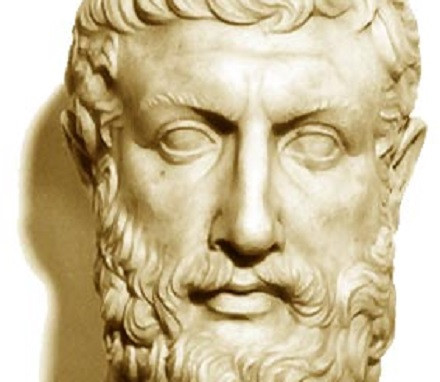
He was also known for challenging great contemporaries of the time. One of his best-known confrontations was against Heraclitus, a materialist philosopher, who considered that the existence of things occurred by opposition, according to Heraclitus it is the joy that allows us to experience sadness. One of the best-known students of the Eleatic school was Zeno of Elea, who, following his teacher’s approach, tried to demonstrate that the being was something unique and complete, there is not a series of distinct and different elements that constitute it, but rather that both the being like the universe are part of the same base, “Nothing comes from nothing” as his mentor would say.
Like other philosophers concerned about the city and its development, He also participated, according to what is said, in the political life of the time Parmenides did so actively, being part of the government and contributing to the drafting of the laws of his city.
Apparently, In the last years of his life he lived in Athens with his most famous disciple, Zeno, with whom it is said that he also shared a relationship, and has been considered his eromenos. It was in Athens where a very young Socrates was able to hear his teachings; apparently he was not the only one to be imbued with his ideas and theories. According to reports, Pericles also attended his interventions with great interest. Parmenides thus influenced not only the thinking of his time, but also that of the future thanks to the transmission of his knowledge.
Parmenides He was the first to establish the superiority of reason over perception and he mainly obtained his prestige thanks to this idea. What we see and capture through our senses is not true. Through our sight, hearing, touch or feelings, always according to Parmenides, only false beliefs and opinions will arise that will make us make mistakes and confuse the truth with what we are capable of perceiving.
Plato deeply admired him not only for his ideas, but for his way of arguing them in an analytical and profound way in his work dialogue with Parmenides. Plato would recognize him as a spiritual father and sees in his ways of thinking different from his own a kind of sentimental betrayal due to the admiration he felt towards him.
His only written work: the poem “On Nature”
His teachings and thoughts are still the subject of many debates, especially in what feelings and situations can tell us about what is true. Although we may not have everything he wrote, and his thoughts are broader. The only work we know of is an extensive didactic poem titled “On Nature”, which was reconstructed thanks to the different fragments found.
The poem is divided into two main parts and a proem ; Each part shows and follows a different path, that of reason and opinion, and for Parmenides there is a true winner: reason leads us to the truth of things, the senses can only capture the appearance, which does not have to be being true, in fact, it can lead us to completely erroneous beliefs and unfounded opinions.
A thought that perhaps we now try to counteract by highlighting some capacities such as intuition and feelings when it comes to knowing and apprehending the world, but important for a time certainly influenced by religions and the lack of critical thinking
The thought of Parmenides
Parmenides continued the search begun by the school of Miletus, in the 6th century BC, trying to explain and establish an origin of nature, or more specifically of existence, since his research focused especially on living beings. For its main representative, Thales of Miletus, this fundamental principle or origin was none other than water (arjé, in Greek), it is from this substance that all living beings would have been created, a theory that, far from being far-fetched, It largely agrees with the theory of evolution.
The importance of this idea, which we now have somewhat integrated, since we know that we evolved from the same elements and then from living beings, was that became the first Western theory about the physical world we know establishing a common origin for all.
Parmenides’ goal was, then, to know the world. But how to do it, if it doesn’t stop changing? That seemed to be the main obstacle he faced. That is why the rational approach he proposed was very important; this perspective also came to influence the very origin of things, which according to him would not be water, but the ability to be that things had in common.
Among the characteristics that are their own and innate would be the ability to be. All beings are, they exist, beings that are not, do not exist. This is complicated to understand and above all it presents itself to misinterpretations that are given by the subsequent thinking between thought and existence. To make it more accessible and understandable we can use an example suggested by Parmenides himself, according to him, noise and light are beings and silence and darkness do not exist and, therefore, are not beings. For Parmenides it was not water, but the existence that was common to all things that were evidently
This principle of being or not being is the origin of his poem. This revelation is given to him, like others, by a goddess. More than anything, this axiom or principle means that space or emptiness would not exist and neither would anything, and, therefore, the human being or the rest of the things cannot come from something that does not exist, if it is the only thing we all share.
Once being is and non-being is not established, the focus is on defining what the properties of being or being are. So being or reality cannot die and is then eternal. On the one hand, it cannot originate in non-being or nothingness, because these simply do not exist, nor can they cease to exist. It is the senses and what we obtain from them that makes us believe that things appear and disappear in reality, “everything is full of Being”, this ultimate property, cannot be divided, cannot disappear, and cannot change. That is, it cannot become non-existence.
These conclusions clearly go against the information that our senses offer us, because thanks to them what we perceive is a world in constant change, not immutable things. This causes Parmenides to present a plea in favor of reason, which is the only one that can bring us closer to the truth.

